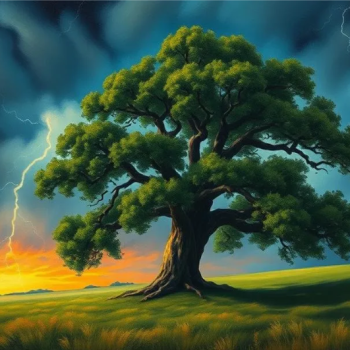This Sunday is Father's Day—a day we reflect on the importance of the role of a guiding parent. We're reminded today that the job of parent is to plant and nurture seeds. When our children quote something we said years ago, we cringe a bit at the reminder of how much influence a parent has, for good and for bad. The parables of the growing seed and the mustard seed are good parables for fathers.
For starters, these parables remind fathers that it's not all up to them. They have help from beyond themselves. (See: "The parable of the growing seed," Mark 4:26-29) They remind fathers that the good results may be disproportionate to the seeds they planted. (See: "The parable of the mustard seed," Mark 4:30-32.)
Some parents are too controlling and want to tell the seed exactly what kind of plant to become. Some parents are too lax and don't help create good conditions for the seeds to grow. While other parents are like the sower in the parable of the growing seed, they sow and wait with patience.
A friend told me about her young son who was doing a science project in his elementary school class. He planted several seeds and was supposed to monitor how quickly they grew. A problem arose, however. Seeds don't grow when chubby, little hands dig them up every day to see how they're doing. A good father, like the person scattering seed in the parable of the growing seed, knew better than to uproot a seed before its time. He knew the sowing was his responsibility but the growth was up to forces beyond his own efforts.
Mark uses Jesus' parable of the growing seed to comfort those in charge of guiding his endangered church. They were planted under adverse conditions. Mark's gospel was written in a time of high anxiety. Church leaders felt vulnerable and helpless. I can see why seed parables, while present in all three synoptic gospels, are particularly prominent in Mark. Seeds are small and vulnerable but can sprout and grow even in tough times.
Most scholars agree that Mark's gospel was the earliest written of the four. It was probably written around 70 C.E., shortly after the Romans destroyed the temple in Jerusalem. It reflects a time of imminent persecution for those who professed the Christian faith. They faced destruction and, as a result, probably felt their efforts were paltry and futile. There is consensus that Mark wrote at about the time of the First Jewish War (66-70 C.E.) toward the end of the reign of the Emperor Nero (54-68 C.E.). At the time, Christians in Rome suffered terrible persecution. (Thurston, Preaching Mark, 3) Speculation about the in-breaking of the kingdom soared at this time. We can see that from Mark 13, which is full of allusions to war and the destruction of the Temple in Jerusalem. Mark's Gospel (13:23) shares with Matthew's Gospel (24:36-44) an emphasis on the need for alertness since the kingdom—ushered in by the Son of Man—would come at a time we do not expect.
Chapter four of Mark is taken up with seed parables, which are the parable of the sower (4:3-8), the seed growing secretly (4:26-29), and the mustard seed (4:30-32). Jesus' series of seed parables about the kingdom of God in Mark 4 teach us that God's rule is "something hidden, indirect, surprising in its manifestation and not easily perceived." (Barton, 41-42) The images are familiar. They tells us that the kingdom is near and breaking into the ordinary world where we dwell. The images have a strangeness or improbability in them. They convey that the kingdom transcends our attempts to define it. Given the adversity that faces it, the harvest is too great in Mark 4:8. The mustard bush is a strangely diminutive metaphor for the traditional picture of the kingdom of God. What we see is failure, hiddenness, and insignificance. Mark wants us to know that God's purposes, though hidden, are still present. He is saying we need to move toward them with confidence. Good fathers know to look beneath the surface of their children's lives and see the good that may not be readily apparent.
As opposed to the pomp and puffed up power favored by the empires of the world, Mark uses seed metaphors to help us discern God's presence and work (kingdom or reign) in small, surprising places.
In the parable of the growing seed (Mark 4:26-29), the seeds are a good image for a mysterious reality whose growth occurs without our instigation and often without our knowledge.
In the parable of the mustard seed (Mark 4:30-32; Matthew 13; 31-32; Luke 13:19), the smallness of the mustard seed—characterized as the smallest of all seeds—is contrasted with the size of the final tree. Parables paint scenes from the natural world but always with a strange twist or incongruous detail. They are, to quote C.H. Dodd's definition, "realistic, yet strange." The fact is that the mustard seed doesn't really grow into a tree but a large bush. This extravagant detail is meant to remind us of the kingdom of God. While it has small beginnings, the results are surprising.





